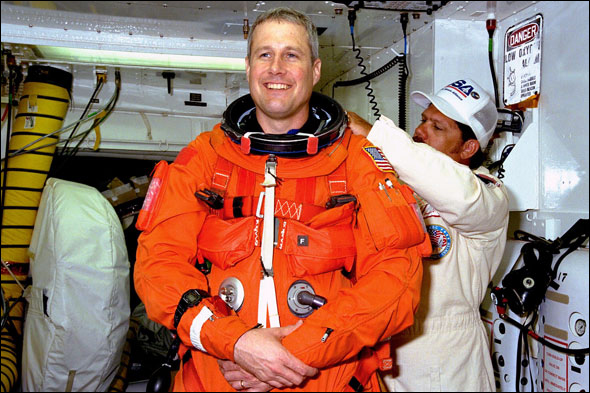Presented by the Penn Humanities Forum and Penn's Center for Sleep and Respiratory Neurobiology
How do you sleep when there’s no sunrise or sunset—and your body is floating in zero gravity? Former astronaut Jay Buckey, MD, discusses the challenges of sleeping in space, where rest is essential to a mission’s success, but where astronauts also must be continuously on call. Could Mars explorers spend 6 months in space and still arrive on the Red Planet rested and ready to go? Find out what scientists are discovering about the body’s ability to adapt to space—and how their research relates to sleepless nights on earth.
Jay Buckey was a payload specialist astronaut on the Neurolab STS-90 mission which flew for 16 days in 1998 on the Space Shuttle Columbia. That flight orbited the Earth 256 times, covered 6.3 million miles, and logged him over 381 hours in space. Its mission was to study how the human nervous system adapts to the absence of gravity. As one of seven crewmembers, Dr. Buckey studied how melatonin (a naturally occuring hormone) aided sleep.
An expert in space physiology and medicine, notably the physiological challenges of extended space travel, Dr. Buckey's research interests include decompression sickness, motion sickness, psychological adaptation to isolation and confinement, and calcium loss in space.
Dr. Buckey received his B.S. in electrical engineering from Cornell University where he also took his M.D. He completed his internship in internal medicine at The New York Hospital–Cornell Medical Center and his medicine residency at the Dartmouth–Hitchcock Medical Center.
He began his space career as a NASA Space Biology Research Fellow at the University of Texas Southwestern Medical Center. While there, he was a co-investigator and project manager for an experiment that flew on the Spacelab Life Sciences-1 and 2 missions (SLS-1 and SLS-2). He also was an alternate payload specialist for the SLS-2 mission. He received two certificates of recognition from NASA for hardware developed for SLS-1.
Dr. Buckey is former president of the American Society for Gravitational and Space Biology, an organization of scientists devoted to understanding the effects of gravity on living things. He is also a flight surgeon in the U.S. Air Force Reserve, 457th Tactical Fighter Squadron.



